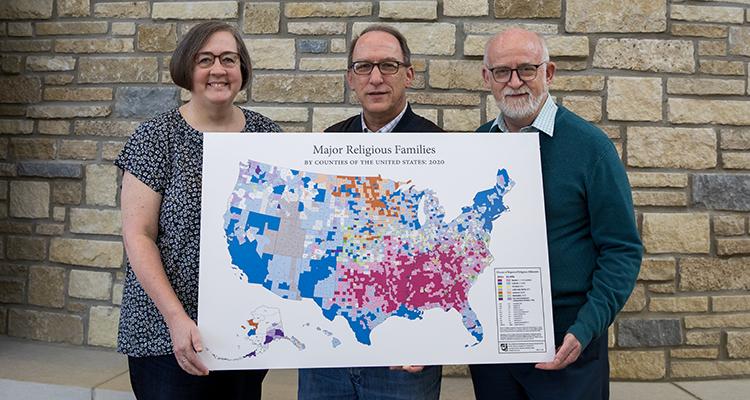
Laura Lance, Rich Houseal, and Dale Jones (left to right) of Nazarene Research Services

Laura Lance, Rich Houseal, and Dale Jones (left to right) of Nazarene Research Services
Nazarene Research Services played an instrumental role in the 2020 U.S. Religion Census, a study conducted every 10 years by the Association of Statisticians of American Religious Bodies.
Rich Houseal, director of Research Services, led the census efforts along with Senior Programming Analyst Laura Lance and Dale Jones, former director of Research Services. Data was collected from 372 different denominations and religious groupings, 35 thousand congregations, and more than 161 million people.
“Religious affiliation varies throughout the country, and there are stories behind this variation,” Houseal said. “Having this data helps pastors and local churches discover the stories that explain their context, and this helps us understand our Nazarene stories and identity.”
The release of the census results in November of this year capped a four-year effort. The collected data reflects the whole year of 2020, meaning data is not submitted until 2021. According to Houseal, it takes more than a year for many groups to compile their data and report it.
Houseal praised Lance and Jones’ work in various aspects of the project. Lance was instrumental in creating the interactive maps available on the U.S. Religion Census website. She geocoded hundreds of thousands of church locations by county.
Jones created the database to track the denominations, religious groupings, congregations, and people and was instrumental in tracking the data for several congregations and denominations that hadn’t done so. Houseal wrote the grant proposal, managed the budget, recruited groups to participate, and received the data.
According to Houseal, “It is the most comprehensive data available concerning religious affiliation.”
He believes this census is unique for its county-level approach, which complements how the U.S. Census is gathered and presented. Pastors and other leaders can accurately match that up to the same information given to them through the census, in addition to health and crime data.
Houseal believes that the denomination’s participation in a project like the census and utilizing the data helps churches to more effectively minister within their local contexts. This allows the denomination to continue practicing its values of being Christian, holiness, and missional.
“These core values point to our relationships with the religious groups around us, our commonalities, and our uniqueness,” Houseal said. “By examining the data available from the U.S. Religion Census, Nazarene pastors and laity will better understand their communities, relationships, and their own Nazarene identity.”
To view the 2020 U.S. Religion Census, click here.